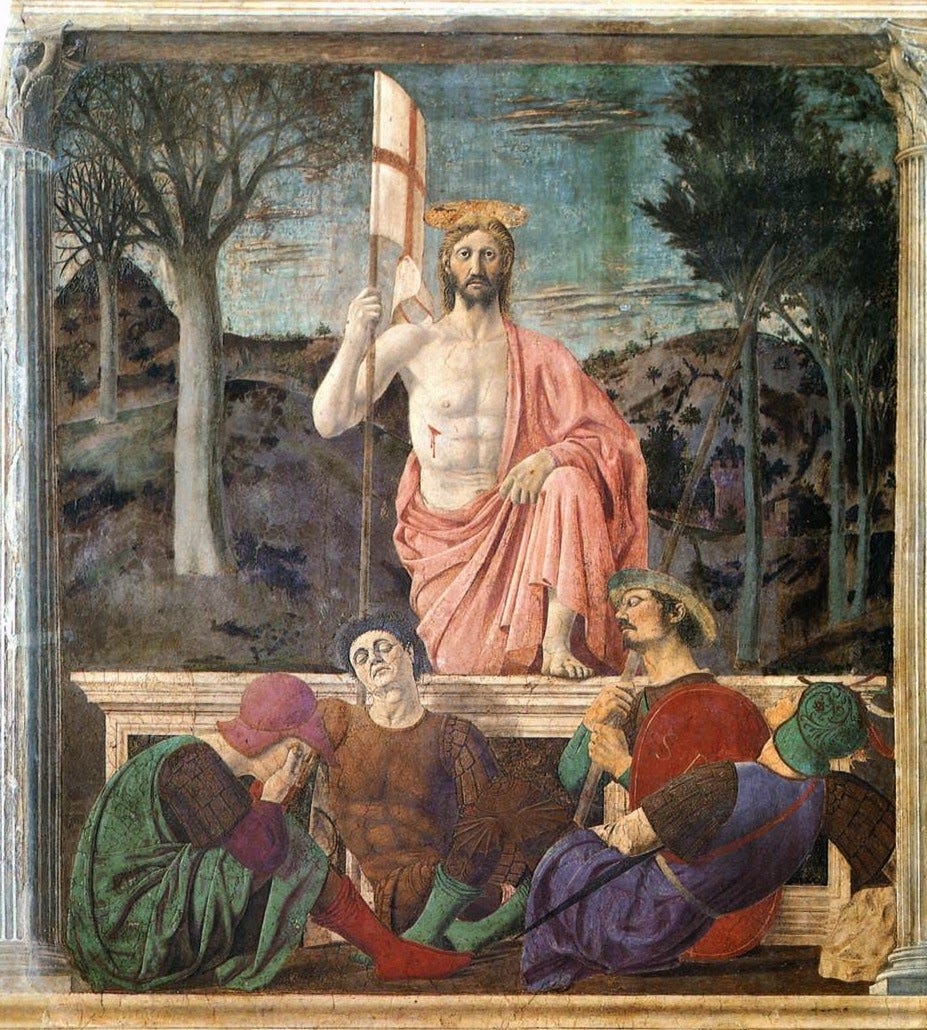Easter: first, second, and long
Dear friends,
If you celebrated Easter last Sunday, either culturally or religiously, chances are that’s the correct verb at the beginning of this sentence. You celebrated Easter. You still might have a few brightly-dyed eggs in the refrigerator, or some candy in a basket. But they’re left over from Easter. Which was last Sunday.
But for 2,000 years most of the Church has celebrated Easter for 40 days. (Or, in recent years, 50 in some churches.) And that makes a lot more sense. I was an adult before I started shaking the feeling that Christmas was the center of the Christian year. People spent weeks getting ready for Christmas—decorations, presents, parties—and Easter lasted barely a weekend.
But I’m going to go with the Church’s DNA, and keep talking about it. Forty-day Easter appears to be the oldest celebration in the Church, older even than Holy Week, and much older than Christmas.
And rightly so:
If Christ be not raised, says St. Paul, your faith is in vain.
But if he is, well, that changes literally everything.
+ + +
There are some undeniably weird things about Francesca’s Resurrection (the soldiers with no legs—and how can the guy on the right possibly be sleeping??) but I love Jesus’s posture, and his expression, and his triumphal flag planted in the middle of the slumber party.
+ + +
One of the (many) scandals of the Church of Jesus Christ is that Christians, who read a Bible that says there is one body and one Spirit . . . one Lord, one faith, one baptism, celebrate . . . wait for it . . . two different Easters most years, and always have. The Catholic wing of the one Body, along with its Protestant offshoots, celebrated Easter last Sunday. This year the Orthodox wing of the one Body celebrates Easter a week later.
Which means that, in war-torn Ukraine, where roughly 78% of the population is Orthodox, tomorrow is Easter.
Which means that Vladimir Putin, who is himself nominally Orthodox (here’s a 19-second video of him receiving Communion) began the battle for the Donbas, the biggest battle in Europe since World War II, during Holy Week, and refused proposals for a humanitarian ceasefire on Easter.
“Ukraine has become the epicenter of a global spiritual battle,” says Pavlo Unguryan, a former member of the Verkhovna Rada—the Ukrainian Parliament—and part of a two percent Evangelical minority in the Church in Ukraine.
We prayed Psalm 88 a few weeks ago (“A Psalm for 2022” and “Water, Water Everywhere”). We prayed it then for ourselves. But the Bible teaches us to pray for each other, too. I’d like to encourage you to take a couple of minutes to pray it on behalf of the Ukrainian Church—Orthodox, Catholic, and Protestant—and, indeed, for all of war-torn Ukraine. Here’s the entire psalm.
+ + +
About the 40 days: let me also encourage you to consider finding some small daily way of celebrating. It doesn’t have to be long or involved.
For me, this year, it looks like saying a brief cheer (remember high school football games?!) every morning:
Christ is risen from the dead
Trampling down death by death
And upon those in the tombs bestowing life!
It’s ancient, used in the Orthodox branch of the one Body. (To be fair, they call it a troparion—a very short hymn—not a cheer!) If you want to sing it, here’s a simple melody.
And, if you do keep celebrating, let me know how?
Grace to you, and peace,
Carolyn



The resurrection was a metaphor taken out of context.